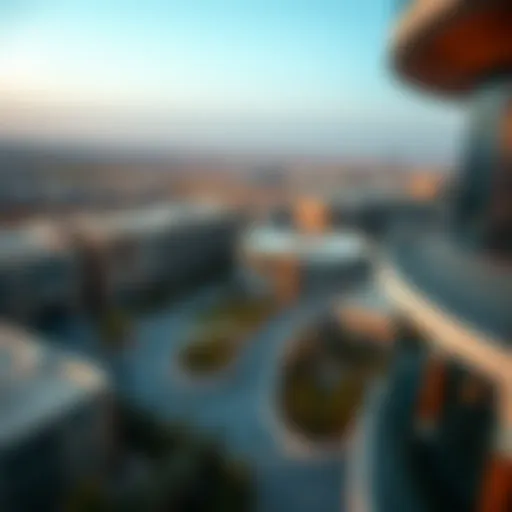Discover Deira Bazaar: Dubai's Iconic Trading Hub
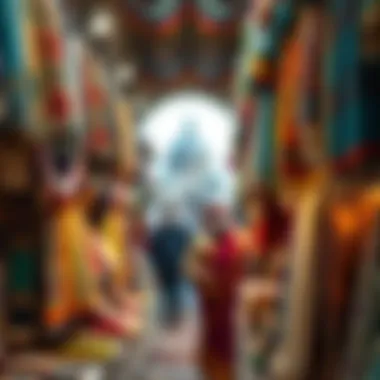

Intro
Set against the backdrop of Dubai's rapid modernization, Deira Bazaar remains a pivotal link to the city’s historic roots. Often buzzing with activity, this trading hub not just showcases a myriad of goods but also encapsulates the essence of Dubai's cultural diversity. As you walk through its winding alleys, every stall tells a story, and each product reflects a rich heritage.
Visiting Deira Bazaar is not merely about shopping; it’s a journey through time. From the brightly colored spices to glimmering gold, the bazaar is teeming with items that tempt locals and tourists alike. It embodies a unique confluence where tradition meets modern enterprise, and exploring it provides valuable insights into the intricate fabric of Dubai's market economy.
For potential investors, understanding the dynamics of Deira Bazaar can offer essential perspectives into the opportunities available in the region. Whether you're an expatriate looking to invest, a homeowner wanting to spice up your décor, or a developer eager to capitalize on Dubai's booming real estate, this guide serves to illuminate the landscape of one of the city's most cherished marketplaces.
Deira Bazaar represents not just a marketplace but a comprehensive environment that reflects both the artistic and commercial growth of Dubai. Embracing the blend of elements present here can enrich your experience and inform future investment decisions.
Let’s delve into the heart of Deira Bazaar and explore its current trends, insights, and navigating tips that make this cultural pearl a must-visit.
Historical Background
Understanding the historical background of Deira Bazaar is essential for grasping the driving forces behind its evolution into one of Dubai's most dynamic trading hubs. This section dives into the origins and the transformative journey of Deira Bazaar, revealing how it became a focal point for commerce and culture in the emirate.
Origins of Deira Bazaar
Deira's beginnings as a trading center trace back to the mid-19th century when Dubai was still finding its feet on the global stage. Initially, a humble fishing village, the region began to flourish due to its strategic location near the mouth of Dubai Creek. Merchant families, primarily from Iran and the Indian subcontinent, started frequenting the area, fostering trade relations that would set the groundwork for what we know today as Deira Bazaar.
Key Factors in the Bazaar's Formation:
- Geographical Advantage: The proximity to water facilitated easy access for boats, making it a convenient stop for traders.
- Cultural Exchange: Early traders introduced new goods and ideas, enriching local traditions.
- Community Roots: The close-knit relationships among traders developed a unique business culture, fostering mutual support and collaboration.
The early days may seem quaint compared to today's bustling marketplace, yet these humble origins played a pivotal role in shaping the character of Deira Bazaar. It attracted a diverse crowd of traders and customers, becoming a marketplace where one could find anything from spices to silks—all wrapped in the warm embrace of cultural exchange.
Evolution Over the Decades
As decades rolled on, Deira Bazaar evolved in tandem with Dubai's rapid growth. The discovery of oil in the 1960s acted as a catalyst, transforming Dubai from a desert outpost into a global city. This shift brought unprecedented economic opportunities. While Deira Bazaar remained fundamentally a trading hub, its offerings and demographics gradually changed.
Milestones in Its Evolution:
- 1970s Development: Infrastructure improved dramatically, with the creation of modern roads and amenities making access easier for both locals and tourists.
- Diverse Offerings: What initially catered mainly to local settlers expanded to include a variety of products from around the world. Popular items included electronics and fashion, alongside traditional wares.
- Technology Impact: The advent of the internet in the 1990s introduced online shopping, influencing traders to adapt by establishing web presence, which attracted a tech-savvy clientele.
While Deira Bazaar retains its timeless charm, it also reflects the changing tides of Dubai's globalized economy. The blend of tradition and modernity is palpable, making it a unique snapshot of history intertwined with contemporary commerce. Understanding its evolution lays a solid foundation for appreciating its current status and the role it plays in Dubai's future.
Cultural Significance
Deira Bazaar is not just a marketplace; it's a kaleidoscope of cultures and traditions converging in a lively and engaging atmosphere. The cultural significance of this bazaar goes beyond mere trading; it provides a window into the rich tapestry of Dubai, where diverse communities coexist and interact seamlessly. In this vibrant setting, not only are goods exchanged, but stories, customs, and culinary delights from various regions are shared, making each visit a unique experience.
A Melting Pot of Traditions
In the heart of Deira, you can witness a fusion of cultural influences that shapes the identity of the city. The bazaar serves as a gathering place for locals and expatriates alike, showcasing how different backgrounds contribute to a shared community life. This collaboration is not just on a social level; it extends into arts and crafts, food, and music that visitors will find evident throughout the area.
For instance, traditional textiles from India interlace with artisanal pottery from Jordan, while the delightful scent of spices from North Africa fills the air. Every corner reveals something new, encouraging curiosity and appreciation for the various cultures coexisting in one place. The bazaar truly resonates as a living museum, reflecting historical trades and the evolution of cultural exchanges that have shaped Dubai for centuries.
Furthermore, the warm atmosphere invites visitors to engage directly with sellers, many of whom are custodians of their own heritage.
"When you step into Deira Bazaar, you don't just observe; you participate in a dialogue of cultures that stimulate the senses and mind."
Festivals and Events
Marking occasions throughout the year, festivals and events at Deira Bazaar reinforce the community bonds while celebrating cultural diversity. Events like the Dubai Shopping Festival and Eid Al-Fitr see the market bustling with activities, performances, and special offerings. During these times, stalls offer unique goods reflecting their cultural origins, giving visitors a taste of traditional craftsmanship and cuisine—perfect examples of how Deira Bazaar exemplifies the spirit of celebration.
Residents and visitors alike enthusiastically partake in these events, showcasing their own traditions through food stalls, crafts, and performances. This blend creates an enriching environment that not only highlights the bazaar's economic vitality but also underlines its commitment to preserving cultural narratives and fostering communal ties.
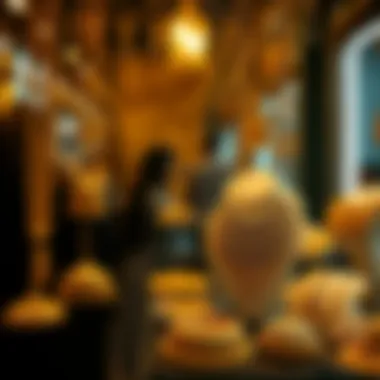

The importance of this cultural significance stretches beyond the bazaar itself, resonating through the fabric of Dubai's society. As a central trading hub, Deira Bazaar acts as a living testament to the city's embrace of diversity and heritage, represented through its vibrant markets, culinary offerings, and communal celebrations. This wealth of culture not only attracts tourists but also instills pride among the residents of Dubai, ensuring that the essence of each tradition continues to thrive within the marketplace.
Market Dynamics
Understanding the market dynamics of Deira Bazaar is crucial for both visitors and investors interested in Dubai’s evolving commercial landscape. This vibrant marketplace echoes not just the sounds of daily trades, but the underlying currents of socio-economic change that shape its operations. Traditional alignments coexist with modern elements, making the bazaar a microcosm of Dubai’s trading evolution.
Traditional vs. Modern Trading Practices
In this bustling hub, traditional trading practices persist alongside modern methodologies. On one hand, you have the age-old bargaining culture, where price negotiations are more art than science. Shoppers engage in a dance of wits in the narrow alleyways, each turn revealing a new stall laden with textiles, spices, and precious metals. Vendors often prefer personal interaction, nurturing relationships with customers over mere transactions. In many ways, this dynamic infuses the marketplace with a sense of community, bridging generations through shared commerce.
On the flip side, modern trading techniques have crept into the bazaar's fabric. With the rise of e-commerce and digital payment systems, many vendors have adapted. Shops may now accept credit cards, and some have established online platforms to reach broader audiences. This duality furthers both the accessibility of goods and the competition among sellers. As an investor, recognizing this relationship between tradition and modernization offers insight into effective strategies for engagement.
Impact of Technology on Commerce
The advancement of technology significantly transforms the commercial landscape of Deira Bazaar. Apps that facilitate payment and logistics have become commonplace, easing transactions that once relied wholly on cash. Automated inventory systems allow for swift management of stock, ensuring that vendors can respond to customer demands with agility. These technological trends are not mere conveniences; they represent a shift in how business is conducted.
Moreover, social media plays a pivotal role in shaping commerce here. Vendors harness platforms like Facebook and Instagram to showcase their unique offerings, reaching an audience far beyond the physical confines of Deira. This online presence demystifies the market for new visitors and expatriates who might be hesitant to venture into the crowded bazaars, thereby driving foot traffic at an accelerated pace.
As we navigate through these developments, it becomes evident that technology is not obliterating tradition but rather enhancing it. The result is a marketplace that adapts to modern needs while maintaining its cultural identity. Such a blend creates opportunities worth exploring—whether you're a local investor eyeing tangible returns or a traveler seeking the authenticity of Dubai's trading spirit.
"Deira Bazaar reflects an ongoing dialogue between the past and the future, where tradition meets innovation, ensuring longevity in Dubai's commercial heart."
In summary, the market dynamics of Deira Bazaar represent a convergence of old and new, making it a fascinating study for anyone interested in the complexities of trading ecosystems in rapidly evolving contexts. Whether you are there to shop, invest, or simply observe, understanding these dynamics offers invaluable context for your experience.
Goods and Offerings
The Goods and Offerings section plays a pivotal role in understanding what makes Deira Bazaar an essential stop for anyone exploring Dubai. This area isn't just about surviving through transactions; it's a bustling point of cultural exchange where you can find items that narrate stories of tradition, skill, and the exotic influences of various cultures. Here, the bazaar transforms into a colorful collage of sights, scents, and sounds that invites everyone—from tourists to seasoned traders—to delve into its vibrant marketplace.
Textiles and Fabrics
Visiting Deira Bazaar, one cannot overlook the myriad of textiles and fabrics that catch the eye. The traditional sari, abaya, and various local garments parade through the stalls, stitched with history and captivating design. The overwhelming variety speaks volumes about the influences of the Middle East, South Asia, and even Africa.
Buyers are often drawn not just by the colors, but by the textures—from the delicate smoothness of silk to the rich, robust feel of cotton.
- Benefits: Fabrics found here can often be customized or tailored, offering a personal touch that mass-produced items lack. They provide excellent quality at negotiable prices, perfect for those who seek unique pieces.
- Considerations: While many vendors are amiable and skilled negotiators, understanding the art of haggling can significantly enhance your shopping experience. Always start with a lower price, showing less eagerness to buy; it keeps the atmosphere light and friendly while allowing you to land a better deal.
Spices and Gourmet Foods
With a zest for flavors come the spices and gourmet delicacies that define much of Middle Eastern cuisine. The fragrance wafting through the air in Deira Bazaar is irresistible, an aroma that can transport you right to the kitchens of homes where these treasures are lovingly prepared. Spices like saffron, sumac, and zaatar offer not just taste but also health benefits, enhancing any dish while adding cultural flair.
- Benefits: Purchasing spices in bulk or even sampling them firsthand can provide insight into their quality and usability. Many vendors are generous with their knowledge, explaining the origins and uses of the products they sell.
- Considerations: It’s wise to engage in some research if you plan to venture into culinary exploration. Learning how to combine spices can be a rewarding venture, allowing for a taste of home right in your kitchen.
Jewelry and Traditional Artifacts
When it comes to jewelry and traditional artifacts, Deira Bazaar holds a treasure trove that reflects the rich heritage of the region. The intricate designs, often inspired by centuries-old patterns, embody the creativity and craftsmanship of local artisans. You’ll discover earrings, necklaces, and rings, usually crafted from gold or silver, each piece telling a story and expressing a unique aesthetic.
- Benefits: Many items are handcrafted, offering authenticity that mass-produced jewelry simply can't match. Purchasing such pieces not only gives you a unique accessory but also supports local craftsmen.
- Considerations: The market can sometimes feel overwhelming due to the sheer number of options available. Having a clear idea of what you’re looking for can help streamline your decision process. Also, understanding the value of the materials used helps in striking fair deals with sellers.
Deira Bazaar encapsulates not just transactions but the very essence of cultural richness through its Goods and Offerings. Understanding the variety is crucial for both visitors looking to immerse themselves in local culture and investors eyeing commercial potentials. This section is more than a mere shopping guide; it's an invitation to experience and appreciate the lively tapestry that Deira Bazaar represents.
Navigating Deira Bazaar
Deira Bazaar, known for its rich history and bustling energy, is more than just a marketplace; it’s a gateway into Dubai's cultural and economic heart. Understanding how to navigate this vibrant bazaar can enhance your experience whether you’re a visitor or considering investment opportunities. This section sheds light on essential tips to maneuver through its winding paths, ensuring you make the most of your visit.
Best Times to Visit
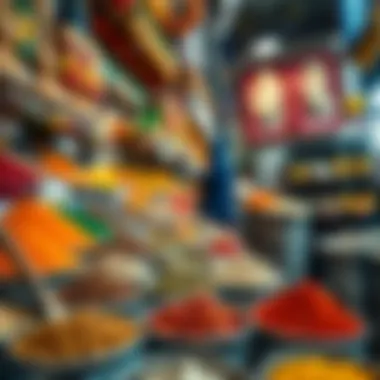

Timing your visit to Deira Bazaar can significantly impact your experience. Here are a few considerations:
- Morning Buzz: Early hours, generally from 8 AM to 11 AM, are best for those seeking a quieter atmosphere to explore various stalls without the thick crowds. This time also allows for cooler temperatures, perfect for unwinding.
- Afternoon Shopping Spree: Post-lunch, around 1 PM to 4 PM, while it can be hotter, many locals prefer to shop at this time. This period sees a swell in foot traffic, which could mean better chances of catching a live demonstration or experiencing a festival.
- Evening Energies: As the sun sets, the bazaar transforms with vibrant nighttime colors and scents wafting from nearby eateries. Between 6 PM to 9 PM, the bazaar finds itself alive, buzzing with excitement, perfect for socializing and experiencing the true essence of Dubai.
Additionally, Fridays and Saturdays tend to be the busiest days, attracting both locals and tourists, making them ideal for soaking in the bustling atmosphere but consider visiting earlier in the week for a more relaxed experience.
Local Etiquette and Customs
Conducting oneself respectfully in Deira Bazaar is crucial, particularly given the cultural diversity and traditions that thrive there. Here are some etiquette tips to keep in mind:
- Dress Modestly: Although Dubai is relatively liberal, wearing modest clothing is respectful, especially in crowded markets. Think light fabrics that cover shoulders and knees to align with local customs.
- Bargain with Charm: Haggling is part of the shopping experience in Deira, but approach the negotiation with a smile and good manners. Initiate conversations rather than jumping straight into the price; this warms up the interaction.
- Respect Cultural Norms: Be mindful of the local customs, particularly during Ramadan when many shops may have reduced hours or observe silence during prayer times.
- Be Patient: The bazaar can get crowded, which tests one’s patience. Adopting a laid-back attitude will enhance your experience and interactions with both vendors and fellow shoppers.
In essence, navigating Deira Bazaar isn’t just about finding your way through the stalls; it’s also about building connections and appreciating the diversity of people and cultures. Embracing these tips will significantly enrich your visit, enhancing both the deal and the experience over the ordinary shopping trip.
"In a bustling marketplace like Deira, patience is not just a virtue; it’s a key to unlocking unforgettable experiences."
For further information about the cultural setting of Deira Bazaar, you might explore resources such as Britannica or local insights on Reddit.
Whether you’re married to making a transaction or simply soaking in the atmosphere, Deira Bazaar has myriad stories waiting to unfold.
Economic Impact
The economic landscape of Deira Bazaar is intriguing, intertwined deeply with Dubai's overall development. This section will delve into the bazaar's contributions to the local economy and how it shapes the livelihoods of many individuals and businesses.
Role in Dubai's Economy
Deira Bazaar holds a significant position within Dubai's economy. As one of the oldest marketplaces, it offers not just goods but a glimpse into the trading heritage of the city. The bazaar stands as a testament to the commercial vibrancy that has characterized Dubai for decades.
It's a vital source of revenue, attracting both locals and tourists eager to explore its unique offerings. According to recent reports, the trade sector, supported by markets like Deira, accounts for a substantial percentage of Dubai's GDP.
The bazaar facilitates the flow of diverse products, ranging from textiles to jewelry, thereby contributing significantly to import and export activities.
"With a constantly evolving industry, the bazaar's influence on trade cannot be overstated; it not only provides economic sustenance but serves as a cultural bridge."
In essence, Deira Bazaar is not just a marketplace; it is an economic engine that drives the community forward. The businesses within its camouflaged alleyways help maintain a steady influx of commerce and tourism, which, in turn, fosters growth across various sectors such as hospitality, real estate, and services.
Contributions to Job Creation
The bazaar is more than a shopping destination; it's a bustling hub of employment opportunities. Many individuals, both expatriates and locals, find jobs here. From shop owners to sales representatives, the economic significance of this marketplace extends beyond simple transactions.
- Diverse Employment: Various roles are created, including artisans, marketers, and vendors.
- Skill Development: Workers gain essential skills in customer service, sales, and negotiation, making them more competitive in the job market.
- Support for Small Businesses: Local entrepreneurs can thrive, contributing to healthy economic competition.
The bazaar thus stands as a pillar for job creation. Without it, many individuals and families may face economic uncertainty. It empowers the local workforce while providing valuable vocational skills.
Investment Opportunities
Investment opportunities in Deira Bazaar are abundant, reflecting both its historical significance and its contemporary relevance in Dubai's economy. The bazaar is not just a mere market; it acts as a focal point for commerce, permitting investors to tap into a diverse array of business avenues. With a vibrant mix of traditional and modern commerce, Deira Bazaar stands as an enticing prospect for real estate agents, investors, expatriates, homeowners, and developers.
Commercial Real Estate Potential
Deira's real estate landscape is characterized by the sheer variety of commercial properties available. From towering office buildings to quaint shops, the area is undergoing continuous development, catering to both local and foreign investors. The strategic position of Deira, close to Dubai Creek and supported by strong transport links, makes it prime territory for commercial investments.
Some critical factors to consider when looking at commercial real estate in Deira include:
- High Foot Traffic: Due to its popularity among tourists and locals alike, businesses here often enjoy substantial foot traffic, which can translate to increased sales potential.
- Diverse Offerings: With a range of products from spices to textiles, the market attracts a broad customer base. This diversity means there's room for various types of businesses, making investments more resilient to market fluctuations.
- Host of Developments: Continuous urban renewal projects aim to modernize the area without overshadowing its heritage. Such developments promise appreciation in property values, giving investors potential long-term returns.
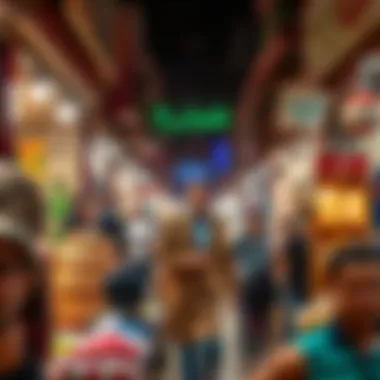

To illustrate the potential, some newly constructed office blocks are being sold at competitive rates. These properties often come equipped with modern amenities, drawing interest from startups and established firms looking to establish a presence in a bustling locale.
Retail Spaces for Entrepreneurs
For aspiring entrepreneurs, Deira Bazaar is a goldmine. The bazaar’s blend of culture and commerce creates an invigorating environment for new businesses. Those aiming to capitalize on this unique atmosphere can look at a few notable considerations:
- Affordability: Rents in Deira can be more affordable compared to other commercial zones in Dubai, making it accessible for new business ventures.
- Market Insights: Being in a trading hub allows entrepreneurs to gain direct insights into consumer preferences and shopping behaviors. This knowledge can be invaluable for shaping marketing strategies and product offerings.
- Networking Opportunities: Deira is home to numerous local and international business owners who converge for trading. This environment fosters networking, partnerships, and collaborations that are crucial for any startup’s success.
"Investing in retail spaces in Deira isn’t just about renting a storefront; it’s about becoming part of a thriving community with rich heritage and promising futures."
By setting up shop here, entrepreneurs not only benefit from a steady customer base but can also integrate unique offerings that reflect the local culture, thereby catering to both tourists and local clientele.
In summary, the investment landscape in Deira Bazaar opens various avenues that promise substantial returns on investment. Those looking to navigate these opportunities should consider both the commercial real estate sector's potential growth and the vibrant retail space available for new entrepreneurs. This blend of tradition and innovation makes Deira a compelling choice for savvy investors.
Challenges and Concerns
The essence of any thriving marketplace lies in its ability to adapt while retaining its core identity. Deira Bazaar, with its rich history and economic significance, faces several challenges that intertwine with the march of modernization. Understanding these challenges is essential for stakeholders, including investors, local retailers, and even visitors who wish to navigate this bustling open-air market. The concerns surrounding development and tradition can shape the future of Deira, making it vital to explore how they intersect within the marketplace.
Preserving Heritage Amid Modernization
As the world rushes towards modernization, one of the most pressing issues is preserving local heritage. Deira Bazaar not only functions as a commercial hub but also as a repository of cultural identity. Each stall, each product holds stories of generations that have come and gone. However, the relentless push for modern infrastructure and commercial advancements raises the specter of erasing these narratives.
Merchants and local businessmen face constant pressure to renovate and upgrade their stalls to attract tourists and modern shoppers. Yet, there are innovative solutions that can help maintain this delicate balance. Incorporating traditional architectural elements into new structures, while also enhancing functionality, is one approach. Local vendors can embrace technology, like e-commerce platforms, to reach broader audiences without sacrificing their heritage.
"To forget one’s heritage is to lose a part of oneself."
The challenge remains to find methods that celebrate history while accommodating newer practices. This synergy not only ensures that heritage is preserved but also allows for a continued evolution of Deira's rich tapestry, attracting those who appreciate both the past and the future.
Market Competition and Regulation
Another aspect that shapes the landscape of challenges within Deira Bazaar is the influx of competition and the regulatory environment. As Dubai continues to grow, new marketplaces and shopping venues sprout up, bringing with them a wave of modern amenities and curated products. This can create a strain on traditional bazaars like Deira, which may struggle to compete with the convenience and allure offered by fully air-conditioned malls.
Regulation plays a dual role in this dynamic. On one hand, government policies aimed at boosting local trade have often benefited traditional markets. On the other hand, strict regulations can limit how businesses operate—impacting everything from pricing to product lines. For traders, understanding the legal landscape is critical. Local entrepreneurs must navigate these regulations wisely to remain competitive while keeping their offerings authentic.
To mitigate the impact of competition, it may be useful for traders to collaborate rather than compete. Pooling resources for marketing, hosting joint festivals, or organizing events can enrich the experience within Deira, making it a sought-after destination for both residents and tourists alike.
By tackling these multifaceted challenges, Deira Bazaar stands a chance to thrive whilst remaining true to its roots. Recognizing the balance between heritage preservation and modernization, along with navigating competition and regulation, can pave the way for a resilient future.
Future Prospects
The future prospects of Deira Bazaar hold significant value, as they unveil a blend of opportunities and challenges that both investors and visitors cannot ignore. Understanding what lies ahead is crucial for anyone aiming to engage with this bustling hub, whether for business or leisure.
Trends Shaping Deira Bazaar
As the world keeps turning and markets evolve, several trends are shaping the landscape of Deira Bazaar. One notable trend is the shift to online platforms. While traditional trading practices remain strong, more vendors are harnessing the power of the internet, allowing them to reach a wider audience. This shift enhances competition and makes it vital for brick-and-mortar stores to embrace technology.
Moreover, the rise in eco-conscious consumerism cannot be overlooked. Shoppers are increasingly mindful of sustainability. They are drawn to products sourced responsibly. For example, markets that focus on organic groceries or local handicrafts appeal to these eco-conscious buyers. With this trend, the bazaars stand to benefit by promoting local artisans and responsible sourcing.
Another important trend involves the integration of cultural experiences into shopping. The marketplace is becoming more than just a retail space; it is evolving into an experience. Live demonstrations of traditional crafts, cultural performances, and tasting sessions of local cuisines are gaining traction as part of the shopping experience. Such additions attract tourists and enrich the market's offerings. By fostering a deeper understanding of the culture, traders enhance customer loyalty, which can lead to increased sales and repeat visits.
Vision for Sustainable Development
Sustainable development serves as a guiding beacon for the future of Deira Bazaar. As modernization engulfs the area, it'll be important to balance growth with the preservation of its unique character. The stakeholders, including local government and community leaders, must come to the table to create a holistic framework guiding development.
A focus on sustainability offers several advantages: it not only maintains the bazaar's cultural heritage, but also attracts a demographic that seeks authentic experiences combined with ethical considerations. Initiatives like promoting clean energy solutions, waste reduction programs, and transportation improvements can pave the way for a greener marketplace.
Moreover, training programs for small business owners on sustainable practices can drive profits while ensuring that economic growth does not come at the expense of the environment. Investment in infrastructure that reflects both modernity and tradition—such as shaded walkways and green spaces—will create an inviting atmosphere that encourages foot traffic.
In summary, the future of Deira Bazaar brims with potential, carved out by evolving trends and a strong commitment to sustainable growth. Investors and consumers alike must keep their ears to the ground, ready to adapt and embrace the changing dynamics that define this iconic trading hub.
"In every challenge lies the seed of opportunity."
Understanding these prospects equips stakeholders to navigate the marketplace effectively and ensures that Deira Bazaar continues to be a vibrant center of trade and culture in Dubai.

